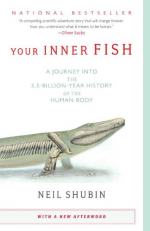|
This section contains 1,274 words (approx. 4 pages at 400 words per page) |

|
Summary
To Neil Shubin finding fish bones in the Arctic Circle is better than finding gold. Science learns about the human body from the skeletal remains of fish. There are many clues about man’s structure of the human body. There are fossils only from a small fraction of all the extinct animals that ever lived and only a small fraction of those fossils are ever found. While Shubin and his colleagues were studying 375-million-year-old rocks on Ellesmere Island, they discovered the snout of a flat-head fish sticking out from a rock. Such a fish could reveal early stages of the human neck, skull and even limbs. Fish bones are used to learn about man’s past.
Planning and predictability are both part of the process in finding fossils. Inspecting rock is the most important function for a paleontologist in the field. They seek...
(read more from the Chapters 1 and 2 Summary)
|
This section contains 1,274 words (approx. 4 pages at 400 words per page) |

|




